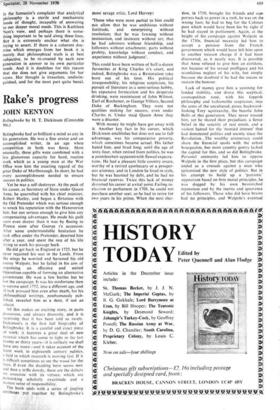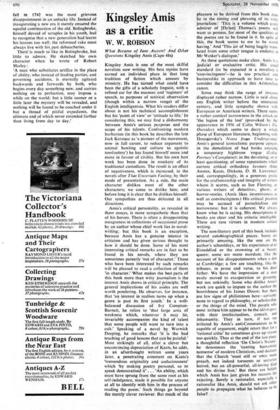Rake's progress
JOHN KENYON
Bolingbroke by H. T. Dickinson (Constable 90s.) Bolingbroke had as brilliant a mind as any in his generation. He was a fine orator and an accomplished writer, in an age when competition in both was fierce. Most unusually, these gifts were combined with a less glamorous capacity for hard, routine work which as a young man at the War Office won him the exacting regard of the great Duke of Marlborough. In short, he had every accomplishment needed to ensure success in politics.
Yet he was a self-destroyer. At the peak of his career, as Secretary of State under Queen Anne, he quarrelled with his chief minister, Robert Harley, and began a flirtation with the Old Pretender which was serious enough to wreck his reputation with the Hanoverian heir, but not serious enough to give him any compensating advantages. He made his guilt seem even deeper than it was by fleeing to France soon after George is accession. After some understandable hesitation he took office under the Pretender, deserted him after a year, and spent the rest of his life trying to work his passage bark.
He did get back to England in 1725, but he never regained 'his seat in the Lords. From the wings he worried and harassed his old enemy Walpole, but he failed in his aim of organising an effective and united Opposition capable of forming an alternative government. He won a few battles but he lost the campaign. It was his misfortune then to survive until 1752, into a different age, and ill-luck pursued him even after death, for his philosophical writings, posthumously pub- lished, revealed him as a deist, if not an atheist.
All this makes an exciting story, in parts glamorous, and always dramatic, and it is surprising that it has been told so rarely. Dickinson's is the first full biography of Bolingbroke. It is a careful and exact piece of work; it features a great deal of new material which has come to light in the last twenty or thirty years—it is unlikely we shall have any more—and it takes account of the latest work in eighteenth century politics, a field in which research is moving fast. If it is difficult sometimes to see the wood for the trees, if even the dazzling hero seems now and then a trifle dowdy, these are the defects We associate with its virtues, which are Painstaking scholarly exactitude and a mature sense of responsibility. The book ends with a series of jingling antitheses put together by Bolingbroke's
most savage critic, Lord Hervey: Those who were most partial to him could not allow that he was ambitious -without fortitude, and enterprising without resolution; that he was fawning without insinuation, and insincere without art; that he had admirers without friendship, and followers without attachment; parts without probity, knowledge without conduct, and experience without judgment'.
This could have been written of half-a-dozen favourites at King Charles ti's court, and indeed, Bolingbroke was a Restoration rake born out of his time. His political irresponsibility, his religious scepticism, his pursuit of literature as a semi-serious hobby, his expansive fornication and his desperate drinking, were reminiscent of John Wilmot, Earl of Rochester, or George Villiers, Second Duke of Buckingham. They were not qualities making for success, even under Charles n. Under staid Queen Anne they were a disaster.
With money he might have got away with it. Another key fact in his career, which Dickinson establishes but does not use to full advantage, was his comparative poverty, which sometimes became actual. His father hated him, and lived long; until the age of sixty-four, when retired from politics, he was a pennilessheir-apparentwith flawed expecta- tions. He had a pleasant little country estate, worthy of a retired apothecary or a prosper- ous attorney, and in London he lived in style, but he was haunted by debt, and he had no financial reserves. Twice this lack of money distorted his career at a vital point. Failing re- election to parliament in 1708, he could not purchase another seat; so he had to retire for two years in his prime. When the next elec-
tion, in 1710, brought his friends and sup- porters back to power in a rush, he was on the wrong foot; he had to beg for the Cabinet post which would have been his by right if he had stayed in parliament. Again, at the height of his campaign against Walpole in the 1730s, financial necessity led him to accept a pension from the French government which would have left him open to another treason charge if it had been discovered, as it nearly was. It is possible that Anne refused to give him an earldom, not because of his sexual profligacy and his scandalous neglect of his wife, but simply because she doubted if he had the means to sustain the honour.
Lack of money gave him a yearning for landed stability, and drove this sceptical, cosmopolitan roué, with his foppish philosophy and fashionable scepticism, into the arms of the uncultured, pious, backward- looking Tory squirearchy, the bucolic John Bulls of this generation. They never trusted him, yet he shared their prejudices; a fierce belief in the sanctity of real estate, and a violent hatred for the 'monied interest' that had dominated politics and society since the Revolution„The wealthy aristocracy could share the financial spoils with the urban bourgeoisie, but most country gentry lacked the capital for this, and so did Bolingbroke. Personal animosity led him to oppose Walpole in the first place, but this campaign ended as a crusade against a man who epitomised the new style of politics. But in his attempt to build up a 'patriotic' opposition based on firm moral principles, he was dogged by his own besmirched reputation and by the inertia and ignorance of his followers. Those who did have brains had no principles, and Walpole's eventual fall in 1742 was the most grievous disappointment in an unlucky life. Instead of inaugurating a new era it merely ensured the squalid continuation of the old. Bolingbroke, himself devoid of scruples in his youth, had to recognise that a new generation had-learnt his lessons too well; the reformed rake must always live with his, past debaucheries.
There is much to like in Bolingbroke, but little to admire. He sketched his own character when he wrote of Robert Harley : 'A man who substitutes artifice in the place of ability, who instead of leading parties, and governing accidents, is eternally agitated backwards and forwards by both, who begins every day soMething new, and carries. nothing on to perfection, may impose a while on the world; but a little sooner or a little later the mystery will be revealed, and nothing will be found to be couched under it but a thread of pitiful expedients, the ultimate end of which never extended farther than living from day to day.'















































 Previous page
Previous page